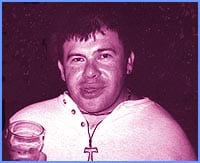William Granados is waiting to come home.
“My soul and mind are in Toronto, but my body is chained to Venezuela,” William Granados writes in an e-mail. He was deported to South America last Jun 17, after being refused refugee status and while a second case based on “humanitarian and compassionate grounds” was still pending.
Granados’s case was supposed to be looked into by Immigration
Canada in February, but so far there has been no word.
“Maybe March, maybe April,” says Ricardo Rodriguez, Granados’s friend and supporter. “But the whole system is so backed up it could be much later. All we can do is wait.”
Rodriguez is a member of the Proactive Intervention Response Group, formed to help bring Granados home and to raise awareness about the treatment of gay men and lesbians in Latin America.
Rodriguez claims the group has gathered more than 300 letters of support for Granados.
“William is in serious danger every time he steps out of his house
because of being gay,” says Rodriguez.
Granados alleges that he is hassled daily by police and neighbours and that he’s been bashed more than once.
“Everyday is a nightmare,” Granados writes. “People have beaten me with rocks, they made nasty jokes when I was walking around the area where I live. I am very sad and depressed.”
Granados’s refugee claim was refused because Immigration Canada did not believe that he is really a member of a sexual minority. In a notice of refusal, the panel found that “his alleged homosexuality is a fabrication.”
No one else is unsure of Granados’s orientation. He was active in Toronto with the gay latino group Hola, the AIDS Committee Of Toronto and the Coalition Against Homophobia. In Venezuela he is targeted as gay as soon as he steps out the door.
Rodriguez says: “When [Granados] first started telling me about what was happening on the streets I said, ‘I don’t want to doubt you but how does everyone know that you’re gay?’ and he said, ‘This is really happening to me. Everywhere I go people can tell.’
“If you have lived openly for a while it is very hard to go back to
being in the closet, it just shows,” says Rodriguez, “the way William walks, the way he talks.”
“One night I was beaten by the police just because I was talking to a
guy,” writes Granados. “The police came and said, ‘What are you trying to have sex on the street?… We can see that you are Marica (gay).”
Survival is difficult economically as well as emotionally. “Being [an] open gay man you cannot get any position,” writes Granados, “they relate gay people with AIDS and mental illness.”
(Granados says he’s not HIV-positive as was previously reported. He says the writer was confused by his statements about volunteering with the AIDS Committee Of Toronto.)
Estranged from his parents in Venezuela, Granados writes that he spends every day “dreaming of coming back to Toronto where my friends and family are… Where you can live in freedom as an open gay man.”
For more info, call Julian Huffer, chair the Proactive Intervention Response Group, (416) 515-0425.

 Why you can trust Xtra
Why you can trust Xtra


